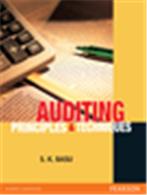Auditing: Principles and Techniques

|
Author(s):
Author:
Sanjib Kumar Basu
- ISBN:9788177581782
- 10 Digit ISBN:8177581783
-
Price:Rs. 770.00
- Pages:628
- Imprint:Pearson Education
- Binding:Paperback
- Status:Available
-
|
Auditing: Principles and Techniques is an attempt to explain the concepts, principles and techniques of auditing, and their applications in practical situations, in a simple and lucid language. The primary object of writing this book is to meet the requirements of undergraduate students of commerce stream for all the Universities in India. However, this book will also be very useful for the students doing M.Com, C.A., MBA and other professional courses. This book is also useful for a layman who is interested in knowing basics of auditing principles and techniques.
Table of Content
- Nature of Auditing
- Different Types of Auditing
- Techniques and Procedures of Auditing
- Internal Control, Internal Check and Internal Audit
- Vouching
- Verification and Valuation of Assets and Liabilities
- Depreciation
- Reserves and Provisions
- Company Audit
- Divisible Profit and Dividends
- Audit Report and Certificate
- Audit of Banks
- Audit of Insurance Companies
- Investigation
- Recent Trends in Auditing
- Professional Ethics and Misconduct
- Special Audit
- Audit of Sole- proprietorship and Partnership Firm
- Audit of the Accounts of Government and Public Sector Undertaking
- Auditing in an EDP Environment
|
Salient Features
- Important and latest case decisions to give legal implications of the topic along with different provisions of the Companies Act and SEBI Guidelines
- Model answers to the questions, both objective and subjective, to show the students the right approach to answer the questions
- Worked out examples, glossary and case studies
- ‘Points to Ponder’ at the end of chapter for quick revision
- Modern techniques of auditing emphasised, retaining the basic concepts and principles of auditing
- Theories and concepts of auditing in a simple way
- Illustrative examples to make the subject simple, understandable, relevant in practice and interesting to learn
|
|
|
|
|